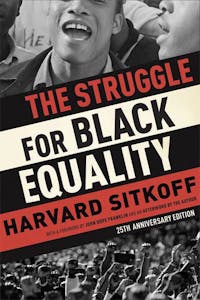The Struggle for Black Equality
 Download image
Download image
ISBN10: 0809089246
ISBN13: 9780809089246
Trade Paperback
304 Pages
$24.00
CA$32.50
The Struggle for Black Equality is an arresting history of the civil-rights movement—from the pathbreaking Supreme Court decision of 1954, Brown v. Board of Education of Topeka, Kansas, through the growth of strife and conflict in the 1960s to the major issues of the 1990s. Harvard Sitkoff offers not only a brilliant interpretation of the personalities and dynamics of the civil-rights organizations—SNCC, CORE, NAACP, SCLC, and others—but a superb study of the continuing problems plaguing the African American population: the future that in 1980 seemed to hold much promise for a better way of life had by the early 1990s hardly lived up to expectations. Jim Crow has gone, but, fifty years after Brown, poverty, big-city slums, white backlash, politically and socially conservative policies, and prolonged recession have made economic progress for the vast majority of blacks an elusive, perhaps ever more distant goal.
Reviews
Praise for The Struggle for Black Equality
"Sitkoff is an excellent storyteller; he captures the drama of events, the calculations, the horror, the unbelievable sadness of struggle."—David Bradley, The Washington Post Book World
"First-rate . . . As an introduction to the subject, this book is outstanding . . . The civil rights movement challenges historians to chronicle the transformations that occurred over three decades [and] few have accomplished this task more satisfactorily than Harvard Sitkoff . . . The Struggle for Black Equality stunningly conveys the passion and anguish of the civil rights movement for those too young to remember and to those who prefer not to forget. From Brown to Bakke, Martin Luther King, Jr., to Malcolm X, and Montgomery to Memphis, the author vividly portrays the many currents flowing into the river of black protest—the individual and social, local and national, practical and philosophical. He skillfully charts the ebb and flow of Afro-American militancy alternating between optimism and despair, and concludes that a third Reconstruction must arise to remedy the economic and institutional ills carried over from the past. Readers will not find 'value-free' history in the pages of Sitkoff's book, for the author seeks to engage his audience, hoping to shatter its complacency. In doing so, he refrains from preaching, and while he never equivocates in his judgments, he carefully presents a balanced treatment."—Steven F. Lawson, University of South Florida, The Public Historian
"Well-written, logically organized . . . Sitkoff has succeeded admirably in retelling with poignancy and compassion a familiar story. The author has dramatically juxtaposed the resiliency of the freedom fighters against the depravity and violence of white opponents to social change along racial lines. The book will be of immense value to today's college students, especially those who experience difficulty comprehending and appreciating the courage and commitment of freedom fighters who willingly sacrificed jobs, lives, and education in the struggle to win equal justice for all."—Darlene Clark Hine, Purdue University, Georgia Historical Quarterly
"Drawing upon a wealth of published primary and secondary sources, Sitkoff fashions a thoughtful synthesis of the people, organizations, and events that constituted the black quest for equal rights in postwar America. His examination of black protest and white reaction in the South, the emergence of Martin Luther King, Jr., and the competitive evolution of the various civil rights groups is especially good . . . The writing is superb . . . Well suited for courses in African American and recent United States history."—Edward Haas, Louisiana State Museum, The Alabama Review
"A brief interpretive history of the Civil Rights movement that recaptures the crusading spirit, highlights the historic moments, defines the role of individuals and groups—and generally gives shape, responsible shape, to the course of events from the Brown decision, in 1954, to the assassination of Martin Luther King, in 1968 . . . This is a fine introduction to the movement per se, and the best one around for students."—Kirkus Reviews
"Sitkoff, by weaving his narrative around the most dramatic episodes—e.g. the Montgomery bus boycott, the Freedom Rides—has produced an excellent introduction to the subject."—William Thomas Miller, History Department, St. Ambrose College, Davenport, Iowa, Library Journal
"Thoughtful, concise [and] well-written . . . Sitkoff offers valuable insights into the sources of strategic events. He explores, for instance, Gandhi's importance to the Greensboro sit-ins of the 1960's; the movement's radical turn in 1963, following Birmingham, as poor blacks entered an essentially middle-class struggle; the late '60s 'malaise' of rights leaders in the face of 'Black Power' demands; and the political considerations behind federal responses to events in the streets."—Publishers Weekly
Reviews from Goodreads
BOOK EXCERPTS
Read an Excerpt
THE STRUGGLE FOR BLACK EQUALITY (Chapter One)Up From Slavery
There is a difference in knowing you are black and in understanding what it means to be black in America. Before I was ten I knew what it was to step off the sidewalk to let a white...


